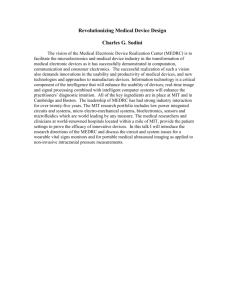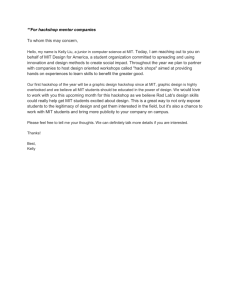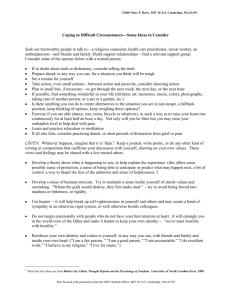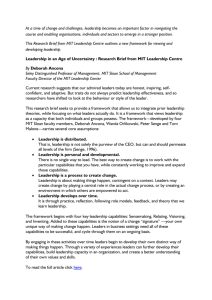Inventing the Organizations of the New Economy Thomas W. Malone MIT
advertisement
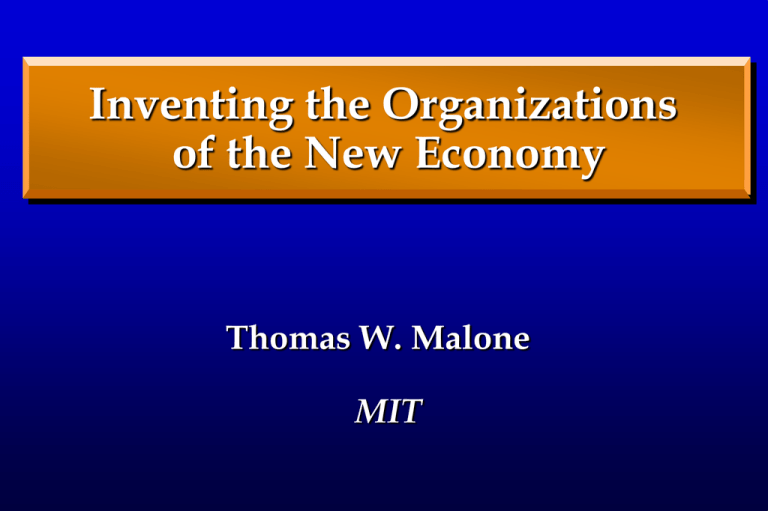
Inventing the Organizations of the New Economy Thomas W. Malone MIT What’s happening? Some possibilities •Speed •Structure •Process S P E E D Question How long does it take to build a house? Videotape courtesy of: Building Industry Association of San Diego San Diego, California Structure Conclusion from MIT research •Highly decentralized systems will be much more important in the future. Linux • Computer operating system – Unix for PCs • Developed and tested by thousands of volunteer programmers around the world • > 3M users today • No one “in control” Organizations in the 20th century Small, local businesses Large, centralized corporations o o o o o 1900 o o o o o o o “Delayering”, “Empowerment”, “Outsourcing”, “Networked organizations” o o x o 1950 o o o o o o o o o 2000 What will these networked organizations look like? Scenario: The E-Lance Economy •1 - 10 people per firm •Temporary combinations for various projects •Examples – Making films – Construction TopsyTail • Hair care products • $80 M revenues • 3 employees (CEO, CFO, Marketing Director) • 20 outsourced vendors include: – tool makers, injection molders, package designer, logo designer, fulfillment houses, mailing list firm, PR, distributors, sales reps • Keeps inside: – new product development and marketing strategy Example: eLance.com • On-line auctions for professional services – Software development, graphic design, research, translation, etc. • Buyer posts project, selects winning bidder, evaluates completed work • Over 200,000 businesses from over 140 countries registered • Over 40% of transactions cross national borders Example: Asynchrony.com • Provides infrastructure for e-lance software development projects. • Project manager posts idea, recruits team members, negotiates shares, manages development and beta testing • Results marketed by Asynchrony.com with 75-90% of revenues going to developers • Over 25,000 active members so far Textile industry near Prato, Italy • Over 15,000 small firms – Average no. of employees < 5 – State-of-the-art factories, warehouses, and other equipment – Cooperative ventures for purchasing, logistics, R&D • Brokers (impannatori) coordinate work – assemble groups of firms to meet needs of specific customers – electronic market for production capacity • Result: Preferred material for fashion designers around the world Questions •What if the managers of an organization are not in control? •What if power, ownership, and action initiatives come from throughout an organization? Internet Internet hosts (thousands) 120000 100000 80000 60000 40000 20000 0 1981 1985 1987 1989 1991 1993 1995 1997 1999 2001 Source: Internet Software Consortium (http://www.isc.org/) Internet (cont.) •Decentralized design principles – “No one in charge” – Agreements needed only on interaction protocols – Anyone who follows protocols can be a » Service provider » Service user » Network provider •Result: Amazing growth and flowering of innovation Question •How much of the intelligence of people throughout an organization can we use in a decentralized organization? Videotape courtesy of Cinematrix Interactive Entertainment Systems, Inc. voice: 415-892-8254, fax: 415-892-4469 Process How can we understand all this? If the boundaries between organizations are blurring. . . If products, tasks, and organizations are all temporary. . . If everyone makes their own decisions. . . . . . How can we think about the organization of work? What will replace organization charts? Conclusion from MIT research •Processes (not structures) are the key building blocks for inventing new organizations. A slogan for process management We need to give as much attention to managing processes as we have in the past to managing products. Needed: Process Knowledge Repositories • Consistent, easy-to-use collections of knowledge about activities, their variations, and interrelationships • Used for multiple purposes • Including many kinds of knowledge... – “Best practice” libraries – Measurement and benchmarking data – Software configuration and change management data – On-line discussion forums Example: MIT Process Handbook • Software – Repository engine, web server, editing tools • Contents – Over 5000 processes and activities » Generic business models and activity types, case examples, on-line discussion forums Example: Dow Corning Corporation • $2.5B chemical manufacturing firm • Installed SAP and standardized key business processes at same time – Needed to design and communicate new business processes • Created detailed process models cross-linked to other business processes and other knowledge Example: MIT eBusiness Process Handbook • Includes: – Case examples – Descriptions of innovative technologies – Descriptions of innovative business models – Etc… • Organized by: – Business models – Business processes Available on the web at: ccs.mit.edu/eph Conclusions • “Empowerment” is not just a fad, but a response to fundamental changes in the economics of communication and decision-making. • Explicitly and systematically managing business processes will be critical for most successful businesses in the 21st century. • What do we really want?

